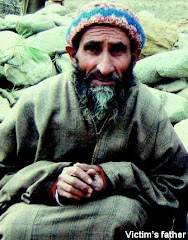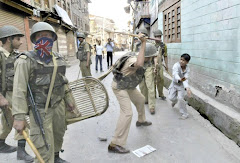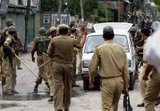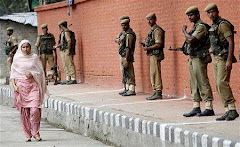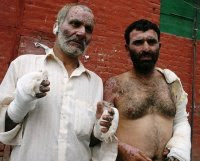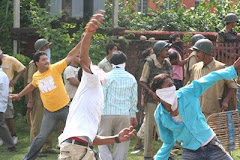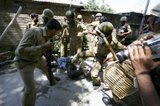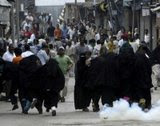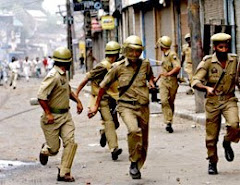By Javaid Malik (Courtesy Daily Greater Kashmir dt. Oct. 16th, 2008)
Srinagar, Oct 15: A paramilitary BSF trooper, Arif Hussain Khati, posted in north Kashmir’s Bandipore district, had to beg before the rioters to spare his family at Shirud village in Maharashtra, after anti-Muslim riots broke out there on October 5. Khati, who is posted in BSF’s 51 battalion told Greater Kashmir over phone from Malegaon in Maharashtra on Wednesday that he being a Muslim nearly proved fatal for him. “You are a Muslim first then a soldier and we can’t spare you,” Khati quoted rioters as having said. While recollecting what he and his family members witnessed, Khati said, “They (rioters) burnt my uniform, identity card and gallantry certificates before ransacking my house on the night of October 6 and tried to push my younger brother Sikander Hussain into the fire.” Khati, a constable, had arrived in Dhule to celebrate Eid after a long time, however, his joy was short lived as three days after the festival, he had to flee from his area to save his family. “Had we not fled they (rioters) would have killed us,” he said. Khati said that as he saw the rioters attacking his house on that fateful day, he called up the Commanding Officer of his battalion and informed him. “My boss told me to seek police’s help and gave me the telephone numbers of the top police officials of the area, but my desperate attempts to contact them proved futile as their phones were switched off,” he said, adding, “Rioters went on a rampage from 8:30 pm to 12:30am in the night, killing scores of Muslims and burning their houses. Had police arrived on time many innocent lives could have been saved. Police arrived around 12:30am, but by then it was too late.” Khati said that after police arrived, he mustered courage and caught hold of few rioters who were trying to run away, but to his utter surprise, Khati said, “Police set them free.” “I put my life at stake for guarding the borders of the country hoping that my family is safe, but after witnessing this incident my impression has changed. If police and government cannot protect a family of soldier, how can they protect the families of common people?,” Khati asked. He said that rioters took away the cash and jewelry and burnt all the documents pertaining to moveable and immoveable assets. “First time in my life I felt helpless. I didn’t know how to react, as I knew they are my own people and not enemies and they are the ones for whom I’m on the border.” Khati said that riots in Dhule, 25 kms from his home village, had broken out on October 5 and people were anticipating more attacks, but to his surprise police was not deployed and no effort was made to prevent the situation from taking an ugly turn. “As commoners we could feel the tension. It was amazing that police didn’t make any arrangements to protect us. There were only 100 houses of Muslims in the area and protecting them was no big deal,” Khati said, adding that he and his family have now shifted to Malegaon, as their own people were in majority in that area. “I had to show my back to the rioters for the sake of my family and flee away, had I done the same on battle field, I would have been called a traitor,” he added. “I’ve been posted in Kashmir for past three years and have participated in many counter-insurgency operations, but in our battalion I have never felt as odd man out as there is no discrimination on the basis of religion. Me and my colleagues are like brothers,” he said. Khati said that his father Shabir Hussain was also in BSF’s 131 battalion and he followed his footsteps to join the force. “I’ve no regrets, I will continue to serve my nation, so what I am a Muslim,” he added. The violence in Dhule started as a minor conflict over some Muslims allegedly tearing up posters put up by local Hindu groups urging Hindus to wake up following the spate of bomb blasts around India. But it soon escalated, resulting in 10 people being killed and nearly 200 injured.
Friday, October 17, 2008
Thursday, October 9, 2008
Economic Self-Sufficiency
Aatif Ahmad Mehjoor comments on the economic strength of Kashmir and the questions related to the issue. (Courtesy: Daily Greater Kashmir dt. Sep. 10th, 2008)
Can Kashmir survive as an independent territory? The recent economic blockade against the Kashmir valley by extremists in Jammu has brought into sharp focus the economic facets of the Kashmir problem. Even separatist political leaders, whose rhetoric was until now exclusively concerned with political rights, have started to express their views about the need to achieve economic self-sufficiency. By focusing on the economic realities underlying the Kashmir problem, the people of Kashmir will be able to better understand the nature of the problem. They will be able to better understand how their so-called leaders have behaved in the last six decades. The economic reality of Kashmir is that it is heavily dependent on India, not only for the vast majority of products consumed within Kashmir but also as a source of funding for the State Government. One only has to look at the J&K State Government’s budget and the sources of funds to see how dependent Kashmiris are on the Indian taxpayer’s largesse. For example, in the 2007-2008 budget, the total budgeted expenditure of the State Government was Rs. 16,267 crores ($3.6 billion). Realised expenditure (i.e. the amount actually spent by the Government) was Rs. 17,354 crores ($3.85 billion). This was not the first time that the Government exceeded the budget. Of the total of Rs. 17,354 crores spent by the government, more than 55% came from the Indian government – the vast majority in the form of grants. How was all this money spent by the State Government? Actual expenditure on interest payments amounted to Rs. 2,031 crores (i.e. 11.7% of the total budget). The budgeted expenditure on interest (i.e. what the Government thought it would be paying) was only Rs. 1,251 crores (i.e. 7.7% of total budgeted expenditure). Despite recommendations from experts to reduce the amount of debt that is being serviced, the State continues to suffer from an increasing debt burden. Interest payments continue to increase. Expenditure on salaries and pensions amounted to Rs. 5,527 crores (i.e. nearly 32% of the total expenditure). Thus, 32% of what our State Government spends goes to provide wages and pensions for government employees and ex-employees. An equally monstrous chunk of the State budget is spent on electricity. The State purchases electricity at market prices but recovers only a small part of the purchase cost because the people of the State refuse to pay for the electricity they consume. It is important to compare these figures with the total economic output of the State. In 2007-2008 the total State Gross Domestic Product (i.e. the total size of the State economy) was Rs. 32,172 crores ($7.15 billion). This means that government spending amounts to nearly 54% of the State’s economy. It also means that the Indian taxpayer is directly responsible for financing nearly 30% of the State’s economy. The figure may be higher because a significant portion of the private sector in Kashmir (such as small provisions stores, shopkeepers, lawyers dependent on ‘service matters’ etc) are dependent upon spending by government employees and such spending itself gives rise to a significant portion of the taxes collected by the State Government. What would happen if Central Government funding disappeared? The State’s economy would shrink by at least 30%, resulting in massive unemployment, chaos and even starvation. During the Asian financial crisis of 1997-1999, the worst suffering country was Indonesia but even its economy only shrank by 12%. Yet, the result was chaos and suffering on a grand scale. If Central funding were to be withheld, the State Government would be unable to finance the monumental wastage of electricity by the population, who would find themselves without electricity, and there would be no salaries to pay to many government employees – from teachers to daily wagers. The State Government would also be unable to raise any funds by borrowing. It can borrow only because the guarantee of the Indian Government stands behind it to support its creditworthiness. Were such a guarantee to be withdrawn, no one would lend money to a State Government whose spending was out of control. None of the people who have written about economic self-sufficiency have thought about these issues. The problem is not the absence of private sector development in Kashmir. The problem is the excessive dependence of the people on government jobs (which leads to enormous spending on salaries and pensions), the theft of electricity (someone has to pay for it after all) and a sense of free or subsidised entitlement to various services (such as electricity, gas, oil or essential commodities). This problem cannot be blamed on India. It is, after all, Kashmiri politicians who vote on the budget in the legislative assembly. It is Kashmiris who take government jobs because private sector work is considered to be beneath their dignity. It is Kashmiris who use electricity and then do not pay for the actual amount of electricity used. If the State Government purchases electricity for Rs. 1,000 crores, then it has to realise this amount from consumers. If consumers only pay Rs. 400 crores, then someone has to foot the deficit of Rs 600 crores! The opening of the Jehlum Valley Road will not get rid of this dependence. It may boost exports by providing an easier outlet to Pakistan. It may be that our fruit growers find better markets in Pakistan where our products fetch better prices. However, it will not change the fact that the vast majority of the people in Kashmir continue to be employed by the State Government. Cross-LOC trade will do little to alleviate the State’s debt burden or put curbs on the Government’s out-of-control expenditure. It hardly needs stating that much of the money spent by the State Government is embezzled by corrupt officials. Together with legitimate salaries and pensions, this money is spent on the consumption of products that must be imported from outside. There is little incentive to engage in the production of these items within the State. Why set up a sheep farm to cater to the high demand for mutton when one can earn an easy living as a daily wager and get to enjoy Rajasthani mutton for a free wage? Even rice has to be imported from outside the State. If the money is not spent on buying products from outside, it is invested in buying land or building “shopping complexes”. It is not invested in projects that generate stable employment and that increase the production of goods for export or as substitutes for imports. The successful running of a political movement requires not only courage and energy, but also wisdom and a vision on the part of those leading the movement. This vision must be all-encompassing. It must provide for all aspects of a people’s life: political, social, and economic. It must not be a motley collection of slogans and chants that are repeated at demonstrations and on interviews. The vision’s rational basis must be articulated by intellectuals and its emotional appeal must be given expression by poets.Take, for example, the movement for Pakistan. At its vanguard were towering intellectuals of the time with charismatic personalities. The movement was not only joined by landlords and other men of wealth, but was primarily led by intellectuals who had studied abroad and who had excelled in their respective fields. Leadership was not unilaterally assumed by any single person. Instead, a natural leader emerged (Jinnah) and everyone approached him and invited him to take charge of the struggle. The movement found poetic expression under the pen of Iqbal and other poets of the Urdu language, who produced masterpieces whilst capturing the spirit of the movement. Now compare this with Kashmir. The ‘movement’ has been made into a commercial business. A number of the so-called leaders have misappropriated vast amounts of money meant for orphans and martyrs. They have educated their children in expensive private schools in England and America, enriched themselves from the funds generously donated by well-wishers for the welfare of Kashmiris, and have monopolised the political space in Kashmir. They have also turned their politico-business outfits into dynastic enterprises, devolving ownership and control to their male children. It is necessary for the truth to come out and for those profiting from Kashmir, whilst everyone suffers, to be exposed. Writing only tributes to the protests and condemnations of India will not achieve anything. The truth is already known to the people of Kashmir. They have to confront it one day.
Subscribe to:
Posts (Atom)










